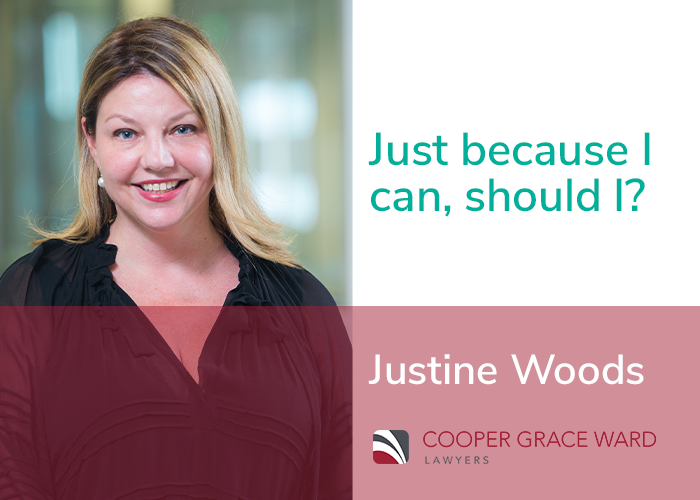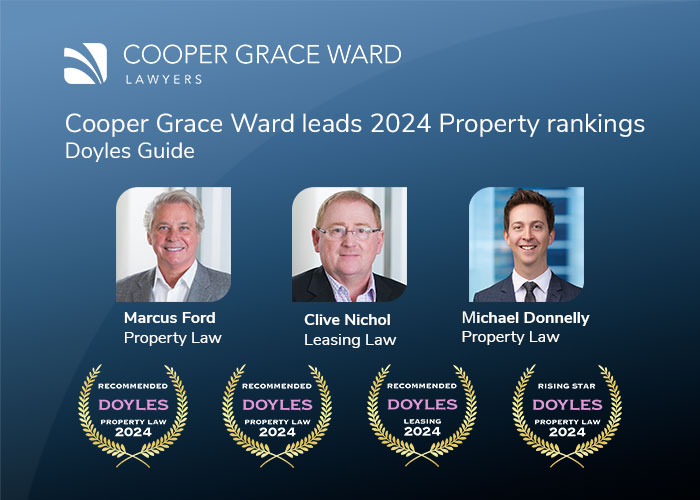In this video, CGW family law partner Justine Woods talks about the doctrine of restraint and the importance of thinking strategically from the beginning of your family law matter.
VIDEO TRANSCRIPT
Hello, hello everyone, I’m Justine Woods, I’m the family law partner at Cooper Grace Ward.
Now today’s presentation is one of two on related themes. So, today is about… and it’s entitled ‘Just because I can, should I?’ The sequel to this presentation is going to be called ‘Just because I can say no, will I? And it’s about really the doctrine of restraint that I try and talk to my clients about, and about thinking strategically from the beginning. Putting aside the emotional overlay, if you can, and really questioning the steps that are taking place around you, bearing in mind that you, as the client, are the controller of the operation. Yes, you will be seeing a lawyer who will give you advice, but it’s your life and it’s only your instructions that can be relied upon. Therefore, exercising some restraint and asking a lot of questions is going to be very important.
Just because I can, should I?
I could give you innumerable examples of when I talk to clients about… well yes you can take all of the money from the joint account, but should you? Should you apply for an injunction against the other party to stop them doing something? Yes, you can, but do you need to? So, if I expand on the injunction example, which quite commonly comes up, they say one party sees an unusually large transaction through an account, or there’s some suggestion that a property is going to be sold, oftentimes, clients will contact me in a panic and say, I’ve heard about a caveat or I’ve heard about an injunction, and they’re absolutely all remedies and sometimes they have to be actioned incredibly urgently and sometimes again without notice to the other side because it’s that critical. But for example, if a property were to be sold, it can’t be sold instantly, if it’s been transferred for no value to an obliging family member, we can apply to get that back. If a bank account has been sucked dry and it’s only a tiny proportion of the whole asset pool, what does it matter? We can correct for that elsewhere. So, think before you act and take a course that will be very expensive, highly litigious and may not really advance the matter.
Changes under the new system
Under the new system, since the 1st of September, with a whole raft of new judicial officers who can be reviewed very easily, it’s not as tricky as an appeal. You don’t have to necessarily argue if it’s a hearing de novo, which effectively means the judge who hears it the second time is hearing it from scratch. Now that again, yes, you can do it. But generally speaking, you wouldn’t, because one, what does it actually achieve? It’s costly. You may well draw the extreme fire of the appeal court and there has been… and the next presiding judge and there have already been, It’s only November and these new rules have only been in place since the 1st of September.
So, you can do things, but should you? The same way, now spousal maintenance… and we’ve got plenty of material on our website about that and some videos for you, but it’s when one party can’t make their own expenses and the other party has the capacity to do so and there’s a legitimate reason why one person has the incapacity and then the payer has to meet the shortfall. Now you have to think seriously about how long you might anticipate the spousal order being made. Are there other funds or resources from which that can be met, because otherwise it’s commercially not viable.
Now we run these sort of cases all of the time. There are absolutely times when it’s necessary, but it’s not in every case that it’s so. So, just be thinking all the time when you’re deciding what next step to take. Is it necessary? Is it worthwhile? Could I achieve the outcome in some other way? And if you’d like to talk about the outcomes or the process, you’re very welcome to contact us here at Cooper Grace Ward.





